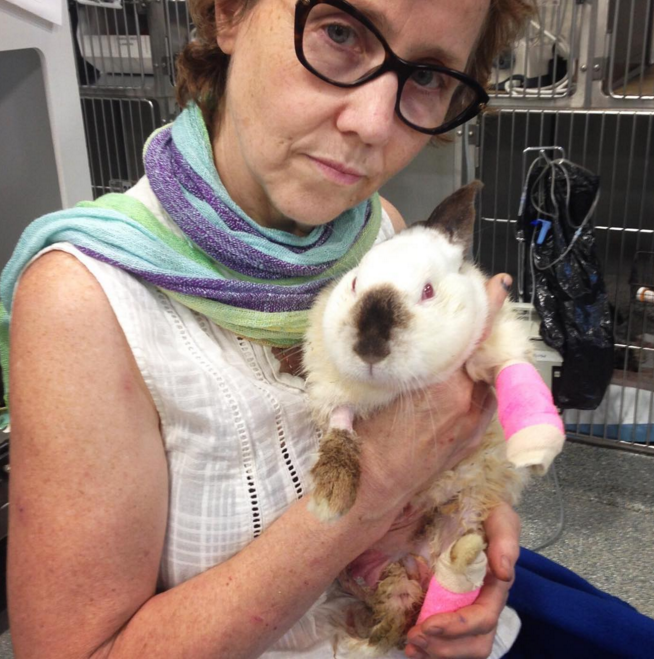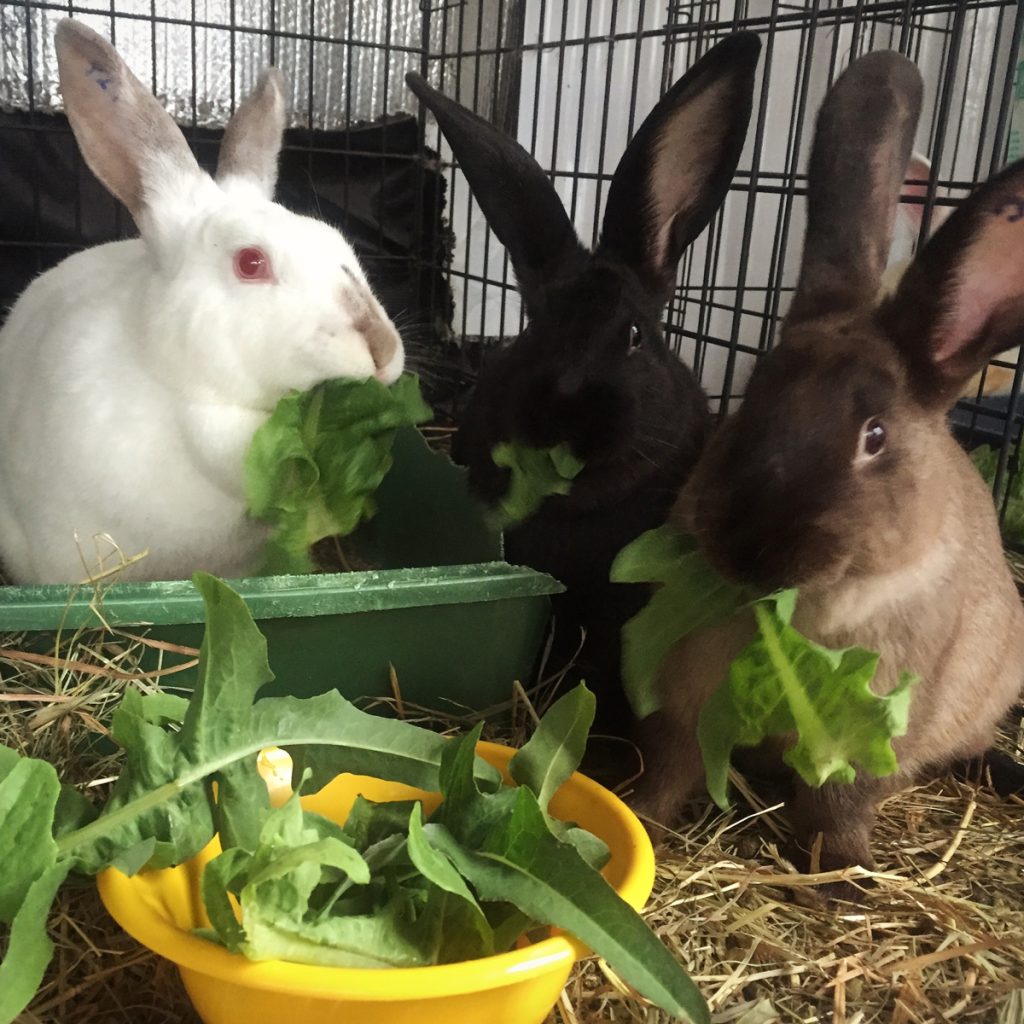Wendy Cook did not expect to spend her summer rescuing more than 100 rabbits.
“I was truly, truly trying to have a quiet summer,” Cook recently told Tricycle from her home in Massachusetts. “I wanted to get more knowledgeable about gardening, and I was going to grow herbs. I was also going to do less email and less social outings.”
Things turned out quite differently. It all began when Cook was tending to her plot at Codman Community Farms in Lincoln, Massachusetts, a suburb of Boston. A friend mentioned that she was concerned about the rabbits being kept and bred for meat on the other side of the farm.
“When she first told me about the rabbits, I was like, ‘Don’t tell me that. This is my quiet time. I want to grow my lettuce and tomatoes,’” said Cook, who has been a practicing Buddhist for the last 30 years. But once she saw the rabbits and the conditions they were being kept in, she said she needed to take action.
After writing a letter to the board running the farm, a meeting was scheduled for July 6 between the farmers, Cook, and her friend.
“I was a little annoyed because I wanted to go to puja [a special ceremony during which offerings are made] for His Holiness the Dalai Lama’s birthday,” said Cook when she realized the date. “But then I thought: advocating for rabbits is my puja.”
The teachings of the Dalai Lama and Lama Zopa Rinpoche were in Cook’s mind leading up to the meeting, and she began to wonder whether there was any possibility that she could purchase the rabbits.
“As a practicing Buddhist, the daily practice is to see all living beings as equal and wishing the best for all of them,” Cook said. “I can be a very assertive Buddhist. I really believe in compassion and action.”
With that in mind, she began doing some calculations in order to figure out how much the rabbits would cost. “I don’t even think I mentioned the possibility of buying them to my husband,” Cook said. “I just had this thought of maybe I can buy all of the rabbits.”
It turns out that Cook was given the opportunity to do just that at the meeting. The farmer told her he had invested in the rabbits and asked her, rather facetiously, if she would like to buy them.
When Cook asked how much, the farmer told her: $20,000.
“I just said yes,” Cook said. “I didn’t have that money myself, but . . . I knew that across traditions there is lot of emphasis on animal liberation in the Buddhist world. “I just saw this window open a fraction and I thought ‘yes.’”

Once Cook made the decision to purchase the bunnies, she swiftly went into action to gather the funds she needed, starting Facebook and CrowdRise pages in order to support the “Great Rabbit Liberation of 2016.” Most significantly, she reached out to one of Lama Zopa Rinpoche’s students, a Singapore-based Tibetan Buddhist monk named Venerable Tenzin Drachom, and explained the situation.
“He just said, ‘I’ll let you know how much we can raise,’” Cook said. “Within 24 hours he contacted me and said all of the money had been raised. I wasn’t expecting it to be that easy.”
Indeed, Cook says she had been mentally preparing to start contacting other Buddhist groups and friends around the world in order to collect the funds. “But there have been so many auspicious signs throughout this story,” she said. “When Ven. Drachom said that he’d secured the money, he was actually on his way to Tibet. And when the money was transferred to me, he was at Mount Kailash [a Tibetan mountain that is a holy site for multiple religions].” Cook took both events, along with the fact that her initial meeting was on the Dalai Lama’s birthday, as signs she was on the right path.
“There are so many things I can’t do,” Cook said. “I can’t get homeless people off the streets. I can’t stop the war in Syria. This was a moment where I felt that I could make a difference.”
Over the next few weeks, Cook, who had never considered herself an animal activist, began learning more about the animal rescue world. Her life quickly began to revolve around figuring out how to care for the 135 rabbits that suddenly became her responsibility. She initially thought she could house them in her home and on her property, but was deterred from doing so after neighbors complained. She then began working with rabbit rescue groups across the East Coast, including members of the House Rabbit Network. “They came in and saved the day,” Cook said. “Some [rabbits] were taken home immediately.” The volunteers helped with medical treatment for the animals and also helped find the vast majority of them homes or places in shelters.
“I have huge respect for people—Buddhist or non-Buddhist—who are incredibly compassionate and in the animal rescue world,” she said. “They work long hours, they are not afraid to travel for miles for even one animal. That’s just what they do.”
Cook and her husband decided to keep about six rabbits in their home as pets and are still looking for homes for about half a dozen more. She stresses that her spirituality remains at the center of the heart of the Great Rabbit Liberation.
“I’ve done this whole thing on faith and a prayer. I was able to give the rabbits imprints of the Buddha’s teachings,” Cook said. “I did this by playing Buddhist chanting they could hear; I recited many mantras to them, and each rabbit was circumambulated around an altar. The vicious suffering circle of samsara has to be broken. By practicing the Buddha’s teachings, we stop creating the causes to be in samsara and start cultivating the causes for our enlightenment.”
♦
The Great Rabbit Liberation of 2016 is continuing to raise funds to pay for the medical treatment and upkeep of the remaining rabbits. If you are interested in adopting a rabbit, please email Wendy Cook at wendy@lamayeshe.com.
[This post was originally published on September 30, 2016]
Thank you for subscribing to Tricycle! As a nonprofit, we depend on readers like you to keep Buddhist teachings and practices widely available.
